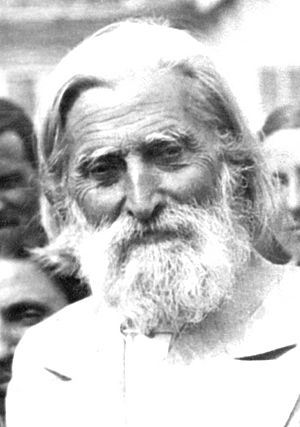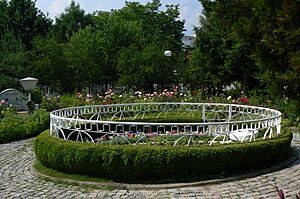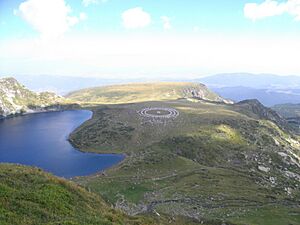Peter Deunov facts for kids
Peter Dunoff (born July 11, 1864 – died December 27, 1944) was a famous Bulgarian thinker and spiritual teacher. He was also known by his spiritual name Beinsa Douno. His followers often called him "the Master." He created a special type of Esoteric Christianity called the Universal White Brotherhood.
Peter Dunoff is very well-known in Bulgaria. He was even voted second in a TV show called Great Bulgarians. He is also listed as one of the 100 most important Bulgarians in history. Many people say he is the most published Bulgarian author ever.
Contents
Biography
Early Life and Education
Peter Dunoff was born on July 11, 1864. He grew up in a village called Hadardja, near Varna, Bulgaria. He was the third child of Konstantin Dunoffsky and Dobra Atanasova Georgieva. His father was a teacher and later became a priest in the Eastern Orthodox Church. He was one of the first to use the Bulgarian language for church services, instead of the older Church Slavonic.
Peter went to high school in Varna. Then, he studied at a Methodist school in Svishtov, graduating in 1886. After teaching for a year, he went to the United States. There, he studied theology at Drew Theological Seminary in New Jersey from 1888 to 1892. He then went to Boston University School of Theology and finished his degree in 1893. He also spent a year at Boston University's School of Medicine before returning to Bulgaria in 1895.
Return to Bulgaria and Teachings
When Peter Dunoff came back to Bulgaria, he was offered a job as a pastor. But he turned it down because he wanted to serve without being paid. In 1896, he wrote a book called Science and Education. In this book, he talked about how humanity would develop a new culture in the future.
After the year 1900, Dunoff traveled around Bulgaria. He gave talks and met many people. He found his first three students, who came from different Christian backgrounds. They all met in Varna in July 1900. This meeting is seen as the start of the spiritual community that grew around Dunoff. He later settled in Sofia, the capital of Bulgaria, and began giving regular lectures.
In 1914, he gave his first public lecture, called Behold, the Man!. After this, he started giving Sunday lectures regularly. These talks explained and explored passages from the Bible.
In 1921, a community called Izgrev (meaning "Sunrise") was created. It was on the edge of Sofia and became a meeting place for Dunoff and his students. Many followers built homes nearby, and it grew into a large spiritual center. Dunoff gave lectures in a new hall there. From 1922, he started new types of lectures, and from 1930, he gave "morning talks" before sunrise on Sundays. His lectures covered many topics, including religion, music, geometry, astrology, philosophy, and esoteric science. Between 1914 and 1944, Dunoff gave about 3,700 lectures. His ideas were also written down from his talks, private chats, and letters.
Paneurhythmy Exercises
In 1932, Peter Dunoff created the Paneurhythmy exercises. These are a series of movements performed to music. They are meant to help people find inner balance and harmony. This practice helps people improve themselves, expand their awareness, and develop good qualities.
The circle dance is a way for people to connect with nature. Each movement expresses a thought or idea. The goal is for the person watching to understand the idea behind the movements. The rhythm of the body movements helps bring rhythm to one's spiritual life.
The word "Pan-Eu-Rhythmy" comes from three parts:
- Pan means "Whole," "Universal," or "Cosmic."
- Eu means "True" or "Supreme," referring to what is essential in the world.
- Rhythmy means "correctness" in movements and in all other actions in life.
Later Life
On March 22, 1939, Peter Dunoff wrote an important message to his students called "The Eternal Covenant of the Spirit." In early 1944, during the air bombings over Sofia, he helped people move to the village of Marchaevo. He stayed in the home of his student Temelko Gyorev, which is now a museum. He returned to Izgrev on October 19, 1944. On December 20, 1944, he gave his last lecture, "The Last Word," and he passed away on December 27.
Legacy
Thousands of Peter Dunoff's lectures were recorded by people writing them down. These notes contain the main ideas of his teachings. He also created many songs and prayers. Among them, The Good Prayer from 1900 is considered very special.
See also
 In Spanish: Peter Deunov para niños
In Spanish: Peter Deunov para niños




